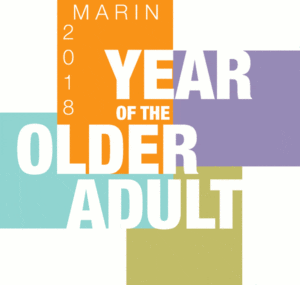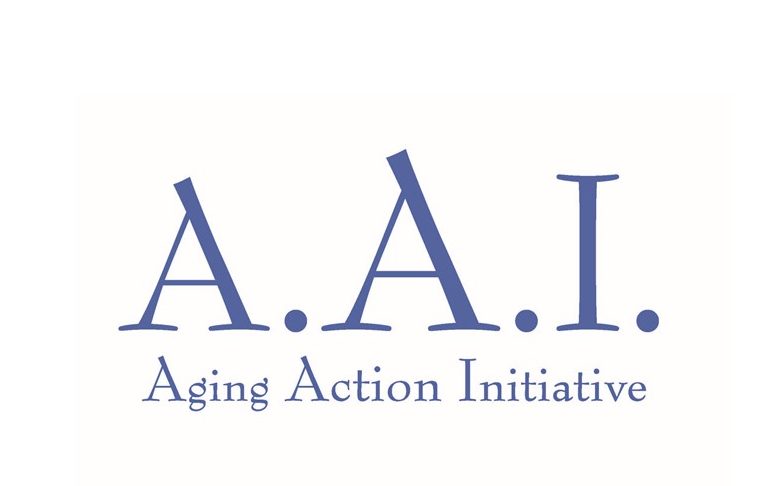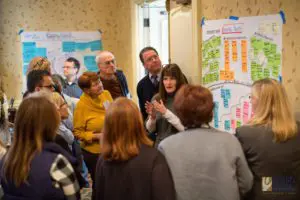Reframing Aging: A New Strategy to Shift Attitudes and Policies
March 1, 2018 | Want to make real progress in promoting active aging? Change the conversation about it. If we experts and advocates strike the right themes and use the right language, we can reach the public in new ways, we can shift attitudes and we can create new policies. This is the conclusion of Frameworks Institute, an award-winning nonprofit comprised of cognitive and social scientists. As the research partner for the Reframing Aging Project, an initiative of Leaders of Aging Organizations, Frameworks has intensively studied how our communications and outreach can drive more informed conversation and policies about aging.
Changing language will change minds
Frameworks is the research partner for the Reframing Aging Project, an initiative of Leaders of Aging Organizations: AARP, the American Federation for Aging Research, the American Geriatrics Society, the American Society on Aging, the Gerontological Society of America, Grantmakers in Aging, the National Council on Aging, and the National Hispanic Council on Aging.
Frameworks has intensively studied how our communications and outreach can drive more informed conversation and policies about aging. Among Frameworks conclusions: stark disparities divide expert and public views of aging. For example, while experts decry rampant ageism, the public has yet to acknowledge it. Experts regard aging as a continuous process, sometimes difficult, but often rich and rewarding, but the public tendency is to view aging fatalistically, as a period of decline and deterioration.
In viewing aging as something that happens to others rather than to all of us, the public regards aging challenges as matters of personal moral responsibility. If some seniors can run marathons and swim oceans, others older can conquer lesser challenges. By contrast, experts and advocates recognize the social determinants of aging and look to policy changes – new workplace practices, Medicare reform and more—to improve the aging process for everyone.
We should use more neutral phrasing such as “older people”
How can we better align public and expert views? According to Frameworks, changing language will change minds. We should be inclusive in our phrasing, saying things like “as we age” or “what we need when we’re older.” We should avoid using words like “elderly” or “senior citizen” that reinforce negative stereotypes. Instead, we should use more neutral phrasing, such as “older people.” In addition, we shouldn’t lead with scary statistics or demographic shifts—the silver tsunami, for example—because these will perpetuate the fatalism and negative perceptions associated with aging.
To shift attitudes and preferences, we also should embed in our communications several Frameworks—tested “frame elements” or themes. For example, sounding a theme of JUSTICE rather than trying to elicit empathy will more likely move people on issues like social isolation. Using a BUILDING MOMENTUM metaphor will reinforce aging as time of possibility and counteract the negativism perpetuated by military metaphors like fighting or battling aging. Similarly, calling on INGENUITY to address aging challenges will resonate with the spirit of American innovation and agency that has spawned societal solutions in other arenas.
Aging related agencies around the country are working hard to digest and incorporate Frameworks’ guidance. Among them is the Community Living Campaign (CLC), a San Francisco-based nonprofit started by long-time community leaders devoted to making the city world class in its inclusion of seniors and adults with disabilities. CLC recently launched a new program, SF ReServe, which provides older adults and people with disabilities paid, part-time work with nonprofits and public agencies.
Many of us in the field have known for a long time that older people want what we all want: to be respected, to connect, to contribute.
CLC has incorporated Frameworks’ themes of justice, ingenuity and momentum into SF ReServe marketing materials. For example, to distinguish SF ReServe from just another jobs program or handout, SF ReServe flyers and fact sheets speak to opportunity, using headlines like “Tapping a Reservoir of Talent.” The materials underscore the irony that despite San Francisco’s reputation for social reform and innovation, “many of those (older people) who helped create our vibrant city are unable to find work and make ends meet.” They go on to describe older workers as representing “a vast pool of experience, wisdom, insights and relationships.”
 CLC’s Executive Director, Marie Jobling, welcomes incorporating Frameworks’ guidance into SF ReServe materials, and, hopefully soon, all of the agency’s communications. According to Jobling, “many of us in the field have known for a long time that older people want what we all want: to be respected, to connect, to contribute. We’ve been working hard to combat negative images of aging and to call people on their biases, but we’ve needed a more disciplined, effective way to talk about what we do. Frameworks provides potent tools that aging experts and advocates can wield to bring about change.”
CLC’s Executive Director, Marie Jobling, welcomes incorporating Frameworks’ guidance into SF ReServe materials, and, hopefully soon, all of the agency’s communications. According to Jobling, “many of us in the field have known for a long time that older people want what we all want: to be respected, to connect, to contribute. We’ve been working hard to combat negative images of aging and to call people on their biases, but we’ve needed a more disciplined, effective way to talk about what we do. Frameworks provides potent tools that aging experts and advocates can wield to bring about change.”
You can access Frameworks’ Aging Communications Toolkit here , and to see an example of putting theory into practice, read about SF ReServe here.
–Diane Krantz, Strategic Consultant and AAI Steering Committee Member
Aging Action Initiative (AAI) is a collective effort of more than 65 different agencies, grassroots organizations, commission and neighborhood groups, funded by the County of Marin and coordinated by MARINSPACE, collaborating for an age-friendly environment. For more information visit agingactioninitiative.org or connect with us on Facebook.




